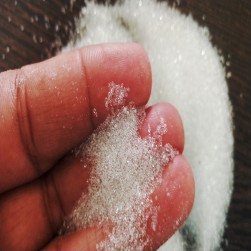Q. What is steel shot used for?
Search
All Categories & Products

Glass beads are used as an abrasive medium for sand blasting and surface preparation operations. It is recyclable and can be used 3-4 times, making it a perfect choice for buyers. An excellent surface finish can be achieved by using glass beads.

| Usage/Application | Shot blasting |
| Size | Microns |
| Color | White |
| Shape | Rounds |
| Material | Glass |
| State | Crystals |
| Minimum Order Quantity | 500 Kg |
Glass beads recyclability makes it an ideal choice for customers to use as an abrasive media for industrial applications. It is mainly used for metal cleaning, surface finishing, shot blasting, and deburring. Glass beads are circular in shape and available in many sizes. Although many applications are made with glass beads, surface preparation is the primary application for glass beads.
During the shot blasting process, glass beads are precipitated onto the metal surface at high speed. Glass beads can also be used for shot peening, deburring, and surface treatment. Larger beads have a greater impact on the surface and remove more contamination. On the other hand, smaller beads are used for lighter tools that require a smooth surface finish.
They are not to be confused with costume jewelry that has a hole in it. They're made of high-quality soda-lime silica glass with a SiO2 content of roughly 70%. They don't contain any lead, iron, or silica. For the most part, they are made out of colorless glass. They can be made from a variety of materials other than soda-lime silica glass, as well as colored glass, depending on the needs of the customer. The normal size range is 5 mm to 0.1 mm but sizes larger than 5 mm can be made based on the needs of the customer.
Blasting with Glass Beads under pressure with Blasting Equipment keeps all foreign matter down to the base metal under tight control without dimensional change, contamination, or overstressing. It produces a metallurgical clean surface finish that is uniform. Blasting materials such as aluminum oxide, sand, and steel shot will either leave a chemical film on the blasted surface or cut the surface. Shot Blasting with Glass Beads thoroughly prepares metal surfaces for any sort of coating, including painting, plating, enameling, and glass lining. The following are some examples of the application.
Physical Properties
| Refractive Index | 1.5 - 1.55 |
| Specific Gravity | 2.5 - 2.55 |
| Bulk Density | 1.6 Kgs / Lit. |
| Softening Point | 696 - 710 C |
| Hardness Mohs | >= 5.5 |
| Hardness (100g LOAD) | 515 Kg/mm2 |
| Rockwell "C" Scale | 57.5 HRC |
Chemical Properties
| Sio2 | 72% |
| Na2O | 13% |
| CaO | 5% |
| MgO | 4% |
| K2O | 3% |
| Al2O3 | 1% |
The refractive index of the glass beads used in road markers is usually between 1.5 and 1.9. They come in a variety of diameters and degrees of roundness, ranging from 100 to 1500 microns in diameter. Glass beads can be mixed with the road marking material during production (intermix beads), added after the road marking is applied (injection beads), or applied to the surface of recently applied road markings before they have set (surface beads) (drop-on beads).
To ensure that the beads do not become displaced, they must be embedded by at least 50% of their diameter. However, when the degree of bead embedment increases, the level of retro-reflectivity decreases; hence, an appropriate balance must be achieved. Some of the beads are likely to become covered in the marking material.
Furthermore, the roundness and size of the glass beads, the viscosity of the road marking material, and the number of beads added to the road marking all influence the quality of the retroreflection produced by the beads. The best retroreflective performance is achieved by using larger beads with smoother, more spherical surfaces. Glass bead price should be distributed at a rate of 400–600 grams per square meter of road marking.
Dustless Blasting Machine is the best glass bead manufacturer in India. We also offer the best abrasives such as steel shots, steel grit, and plastic media for many industrial applications at affordable prices. There are many other shot blasting machines, portable shot blasting machine, sand blasting machine, thermal spray gun, metalizing gun, pressure blasting machine also available as per customer specifications.
In order for us to quote for your requirement, please provide us with the following information:
Q. What is steel shot used for?
Ans.
Steel shot is a form of ballistic substance that is used as a projectile in shotguns and pellet guns, as well as for abrasive blast cleaning and shot peening.
Q. What are the properties of steel shot?
Ans.
Hardness, shape, size, toughness, wear resistance, and low cost are all requirements for carbon steel shot. This article describes some of the elements that allow the required qualities to be realised. When exposed to air, the iron in carbon steel oxidises. Iron oxide is formed when iron and oxygen combine.
Q. How is steel shot manufactured?
Ans.
Water jet and centrifugation are combined in rotational centrifugation. Place the molten steel in specialized equipment and rotate it through a metal membrane. The metal will form small droplets and descend vertically into the water as a result of the centrifugal force and surface tension, eventually forming steel shots.